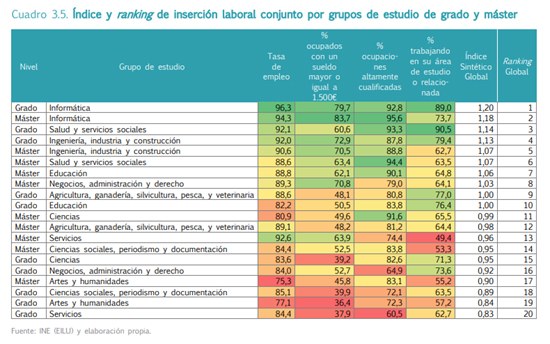The UPC is one of the universities with the highest graduate employment rate in Spain according to the U-Ranking
Developed by the BBVA Foundation and the Valencian Institute of Economic Research, the U-Ranking project published an analysis of graduate employment in the Spanish university system by degree subject area and by university on 16 May. The UPC is ranked 2nd-4th among 67 universities analysed.
Jun 22, 2023
The website of the U-Ranking now features a tool with indicators of graduate employment by degree subject area and by university. This tool comes with an analysis of graduate employment rate, a report that is added to the Choose a University tool, which helps students to select the most suitable degree and university based on their priorities. With an index of 1.12, the UPC is ranked in the 2-4 band in the overall ranking of Spanish universities with the highest graduate employment rate.
The analysis of university graduate employment reveals that the subject degree areas Computer Science, Engineering and Healthcare have higher graduate employment rates and a higher percentage of graduates whose monthly income is equal to or greater than €1,500 and who land highly qualified jobs that are related to the subject area of their degree. Technical universities achieved the best results, with outstanding rates in the Computer Science and Engineering subject areas—all of them in the first quartile. Generalist universities, however, obtained poorer results and are ranked in the bottom third.
Specifically, Computer Science degrees have the highest graduate employment indicators, with 96.3% employment rate, almost 80% of graduates whose monthly income is equal to or greater than €1,500, 92% of highly qualified jobs and 89% of graduates with jobs related to the subject area of their degree. The second position is for subject areas Healthcare and Social Services, followed by Engineering, Industry and Construction, with 92% employment rate and almost 73% of graduates whose monthly income is equal to or greater than €1,500. This group has almost 90% of highly qualified jobs and almost 80% of graduates with jobs related to the field of their degree.
The report is based on data from two sources. First, data from the graduate employment survey by the Spanish National Statistics Institute (2013-2014 graduates’ status in 2019). It analyses data such as the employment rate, the percentage of graduates whose monthly income is equal to or greater than €1,500 and the correspondence between employment and the level of education and between employment and the subject area or field of the degree. Second, data provided by the Spanish Ministry of Universities and the Social Security system, such as the percentage of graduates affiliated to the Social Security, the contribution base and the correspondence between jobs and the level of education considering the contribution group.
When analysing the first data group, the publishers used a synthetic indicator to classify each degree. In the ranking of graduate employment by degree, the top ten are Medicine and nine Engineering degrees: Aeronautical Engineering, Computer Engineering, Industrial Technology Engineering, Informatics Engineering, Telecommunications Engineering, Software Development and Multimedia Engineering, Energy Engineering, Electrical Engineering and Electronic Engineering.
The publishers grouped 101 bachelor’s degrees into 10 subject areas, which were ranked as follows: 1st Computer Science; 2nd Engineering, Industry and Construction; 3rd Healthcare and Social Services; 4th-5th Agriculture, Livestock, Forestry, Fishing and Veterinary Science; 4th-5th Education; 6th Business, Administration and Law; 7th Sciences; 8th Social Sciences, Journalism and Documentation; 9th Services; and 10th Arts and Humanities. Master’s degrees were ranked as follows: 1st Computer Science; 2nd Engineering, Industry and Construction; 3rd Business, Administration and Law; 4th Healthcare and Social Services; 5th Education; 6th Services, 7th-8th Sciences, 7th-8th Agriculture, Livestock, Forestry, Fishing and Veterinary Science; 9th Social Sciences, Journalism and Documentation; and 10th Arts and Humanities.
The joint graduate employment ranking for bachelor’s and master’s degrees showed the following results:

Source: Pérez, F., Aldás, J. (dir) (2023) U-Ranking, Análisis de la inserción laboral de los universitarios. Diferencias entre titulaciones. Valencia: IVIE p. 37


